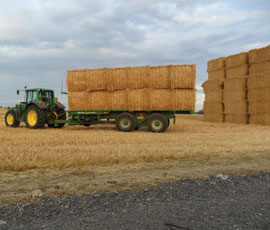Harvest round-up: Finishing in the South

Showers have temporarily brought harvest to a halt in some areas, but elsewhere combines are racing to finish the final fields.
In Powys, combining was halted late last night (29 August) following a shower at Broniarth Farm, Newtown, but Paul Phillips was happy with yields so far.
“Considering the growing season we’ve had, it’s been a very pleasing year,” he said.
Tipple spring barley, drilled on 9 April, averaged 7.4t/ha, and came off at 16% moisture. “It’s the earliest we’ve ever put the crop in, but we’ve never looked back.”
Across in Northern Ireland, very few cereal crops had been cut yet around Newtonards, Co. Down, with the wet winter meaning most farmers were waiting for spring crops to ripen.
“There is very little winter crop in the ground because of the bad weather, so everyone’s waiting for spring barley,” said Philip Davidson, director of North Down Grain.
“It’s been sprayed off so we should have a better picture of things next week.”
Crops were also taking a while to ripen in Northumberland, with harvest making steady progress at East House Farm, Ponteland.
“We’ve finished the winter barley and oilseed rape, and done about half the wheat,” said James Walby. “Yields have been about average – but that is better than we’d expected.”
In stark contrast, harvest was almost over at Silton Manor Farming, Gillingham, Dorset, where Keith Harris had encountered very variable results.
“The winter wheat’s up on last year’s yield, but below average,” he said. Yields averaged 7-8t/ha, with the crop coming off the field at around 17% moisture.
“JB Diego was the outstanding variety, with some hitting 12t/ha. We didn’t have to dry much and the quality has been very good.”
In Lincolnshire, Mark Woodroff had also finished the cereal harvest at Hundreds Farm, Crowland, clearing up the last of the spring wheat yesterday.
“It was drilled after sugar beet and yielded over 7.4t/ha, so I’m quite happy with that,” he said.
Grafton winter wheat averaged about 9.9t/ha, compared to 8t/ha last year. “This year, we drilled 80ha of maize on a contract farm, to supply an anaerobic digester – so we’ve had less wheat to harvest,” said Mr Woodroff.
“We have a lot of resistant blackgrass issues, so drilling maize instead of wheat, especially after the wet winter, has proven to be very useful.”

